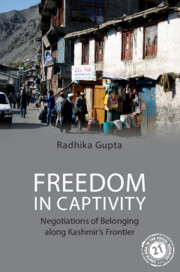Book contents
- Frontmatter
- Contents
- List of Figures
- Acknowledgements
- List of Abbreviations
- Notes on Transliteration
- Introduction: Freedom in Captivity
- 1 Genealogies of Political Consciousness
- 2 Reforming Self and Society
- 3 Fighting for Justice
- 4 Talking about Culture
- 5 Living on the Edge
- Epilogue
- Glossary
- Bibliography
- Index
3 - Fighting for Justice
Published online by Cambridge University Press: 10 January 2023
- Frontmatter
- Contents
- List of Figures
- Acknowledgements
- List of Abbreviations
- Notes on Transliteration
- Introduction: Freedom in Captivity
- 1 Genealogies of Political Consciousness
- 2 Reforming Self and Society
- 3 Fighting for Justice
- 4 Talking about Culture
- 5 Living on the Edge
- Epilogue
- Glossary
- Bibliography
- Index
Summary
Selective ideological and programmatic appropriations of transnational Shi‘i discourses from West Asia were not restricted to reforming self and society. Experiments with Khomeini’s revolution were also mobilised in the realm of politics through a more active engagement with electoral democracy. Legitimised by ‘fighting for justice’, both the IKMT and the Islamia School directly entered local politics. Until India revoked Article 370 against the wishes of Kashmiris and Kargilis, people in Kargil praised Indian democracy. They invested hope in representative democracy as an avenue for freedom from oppression. This chapter takes you on a journey into local politics and the crystallisation of political consciousness. It describes the acute politicisation of Kargili society and further analyses calibrations of Shi‘i political theology with Indian nationalism.
A defining feature of the Iranian Revolution was a move away from the traditional Shi‘i political stance that was dominated by a soteriological outlook that emphasised redemptive suffering to actively fighting for justice in this world. Historically, Twelver Shi‘as have believed that the Twelfth Imam, Mahdi, the current spiritual and political head of the community, is in occultation and that no temporal ruler could legitimately fulfil his role. They see themselves as a community of suffering awaiting the return of the Mahdi to bring about justice in this world. This outlook manifested in Shi‘as accepting the necessity of a passive political stance around the world. Often minorities, and living under oppressive regimes, Shi‘i communities in diverse contexts have historically accommodated themselves to different nation states. In this classical Shi‘i stance, the spiritual sphere is separate from the political, and the two could be united only upon the return of the Twelfth Imam. Thus, a political leader of this world could not be the spiritual head of the Twelver Shi‘a. Khomeini’s revolutionary ideology urged a shift away from this passive position. He argued that religion and politics are inseparable, calling for the shedding of a passive attitude towards the experience of injustice. Fighting against injustice in this life was crucial to redemption in the afterlife.
Political action came to be redefined within the Karbala paradigm, which recounts Imam Husayn’s battle against the unjust rule of the Umayyad regime in 680 CE.
- Type
- Chapter
- Information
- Freedom in CaptivityNegotiations of Belonging along Kashmir's Frontier, pp. 97 - 128Publisher: Cambridge University PressPrint publication year: 2023



